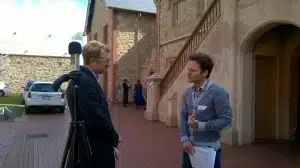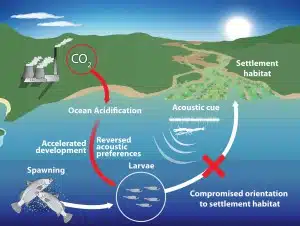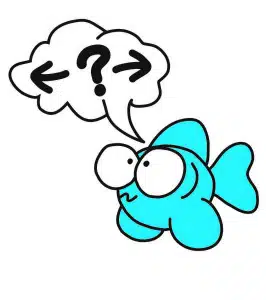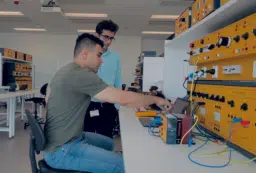What difference can carbon dioxide make to fish? A huge one as it turns out.
New research from the University of Adelaide suggests that rising atmospheric carbon dioxide will reduce the number of baby fish that make it to adulthood.
“After hatching in the open ocean, baby fish travel to reefs or mangroves as safe places to feed and grow into adults,” explains Tullio Rossi, lead author on the study.
“But when ocean acidity increases due to higher dissolved carbon dioxide, a number of factors reduce the chance of fish actually finding those safe havens.”
Baby fish find those reefs and mangroves by listening: snapping shrimps and other creatures produce an underwater ruckus the fish are able to hear and follow. But increasing ocean acidity changes the neurological pathways in fish. Their interpretation of environmental cues like snapping shrimp noise becomes confused, so that instead of heading towards those sounds, they turn tail and swim away.
“If we continue to burn fossil fuels at current levels we could put baby fish in serious trouble, ultimately leaving them lost in an acidified ocean,” says Tullio. “And this would inevitably lead to fewer adult fish and, potentially, reduced stocks for the fisheries we depend on for food.”
“The good news is that we are still in time to limit our carbon emissions to levels that are not too dangerous for marine animals,” says Tullio.
Increasing ocean acidity is a direct effect of rising levels of atmospheric carbon dioxide from human activities such as burning fossil fuels.
Tullio presented his research at Fresh Science South Australia 2015.
Fresh Science is a national program that helps early-career researchers find and share their stories of discovery. Over 30 early-career researchers nominated for Fresh Science SA, which was held at the South Australian Museum (training) and The Lion Hotel (public challenge event).
Fresh Science South Australia was supported by the The University of South Australia, The University of Adelaide, Flinders University and the South Australian Museum.
Contact: Tullio Rossi, University of Adelaide, tullio.rossi@adelaide.edu.au









 Fresh Science is on hold for 2022. We will be back in 2023.
Fresh Science is on hold for 2022. We will be back in 2023.